Charles E W Bean, Diaries, AWM38 3DRL 606/42/1 - April 1916 - Part 3
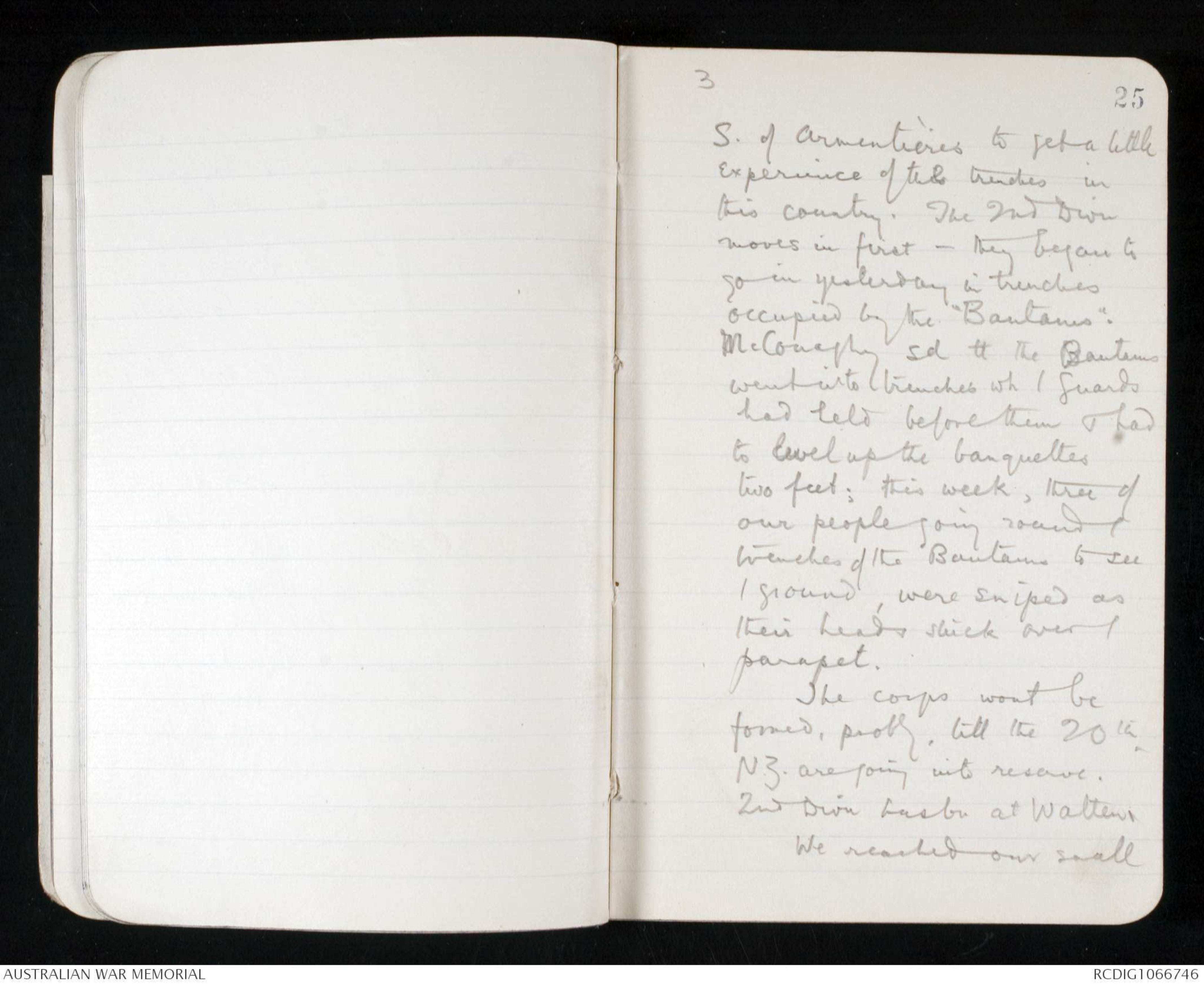
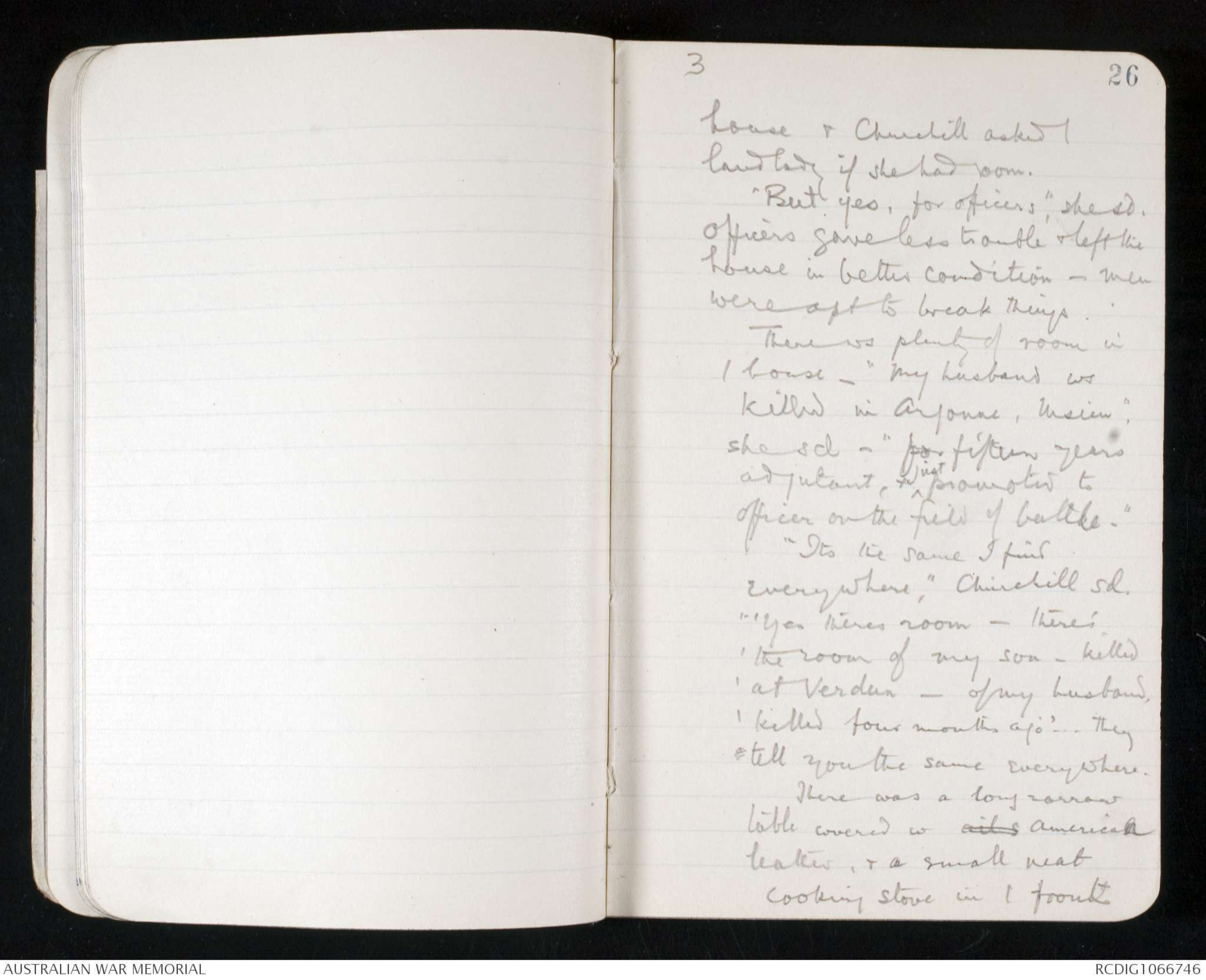
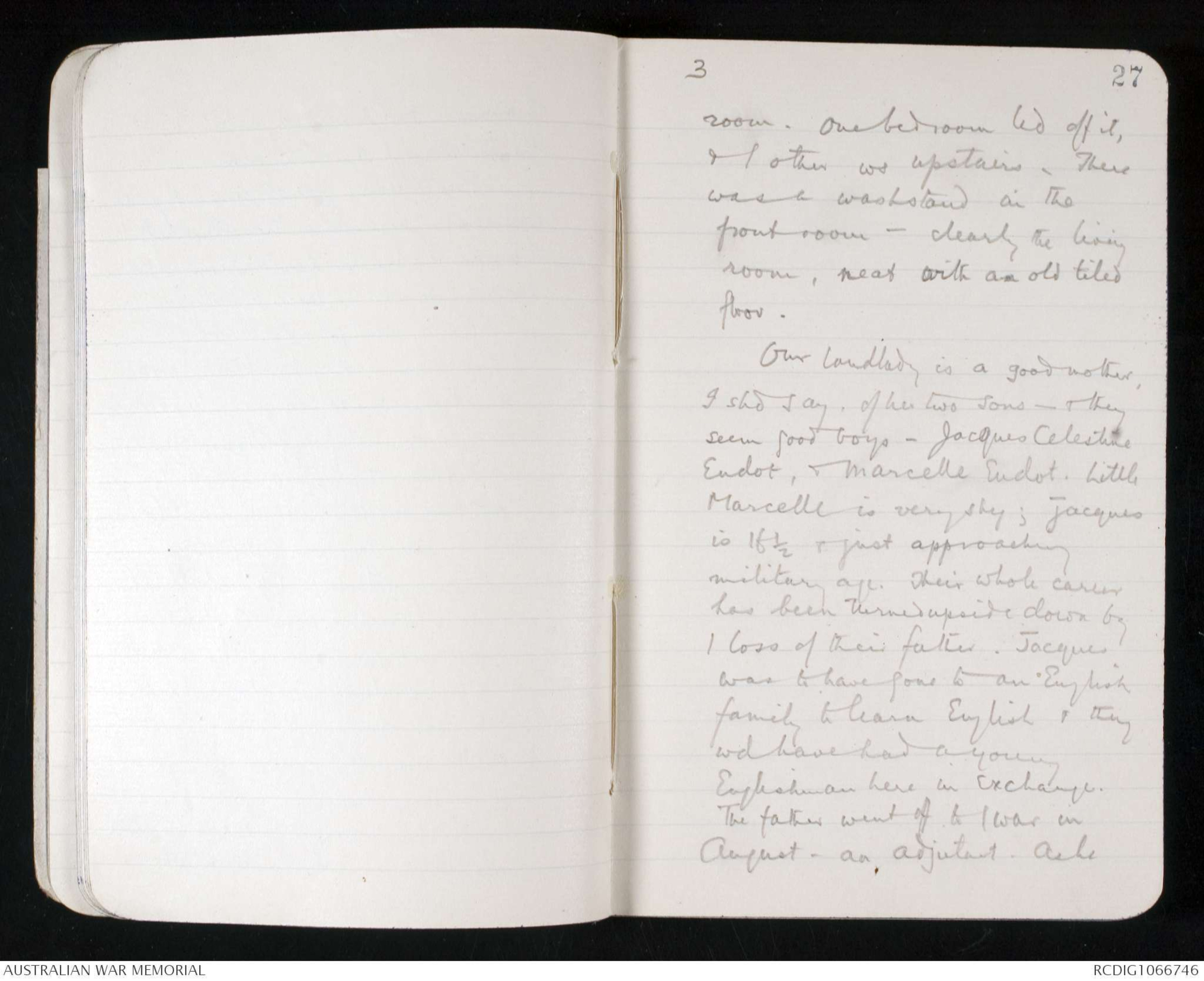
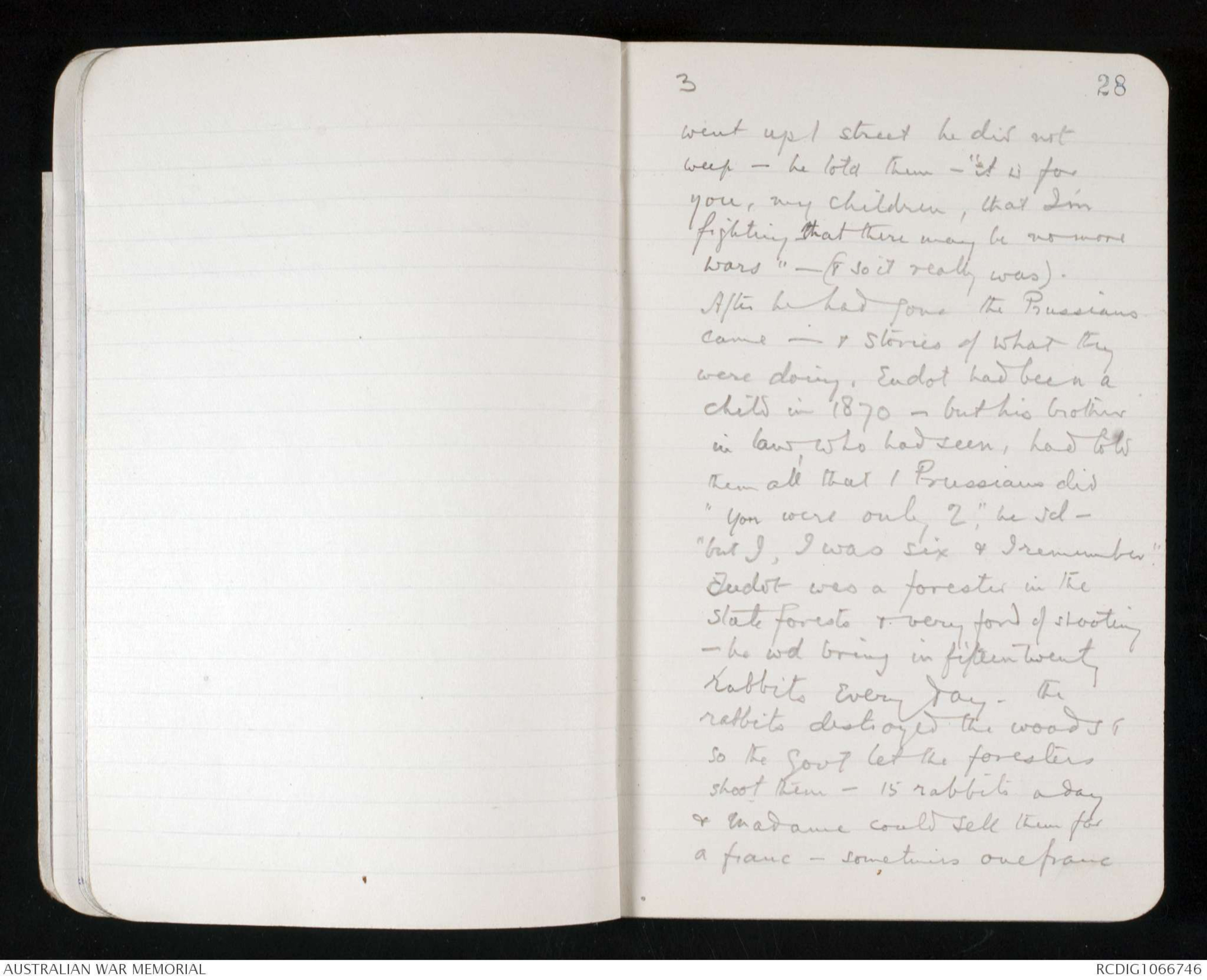
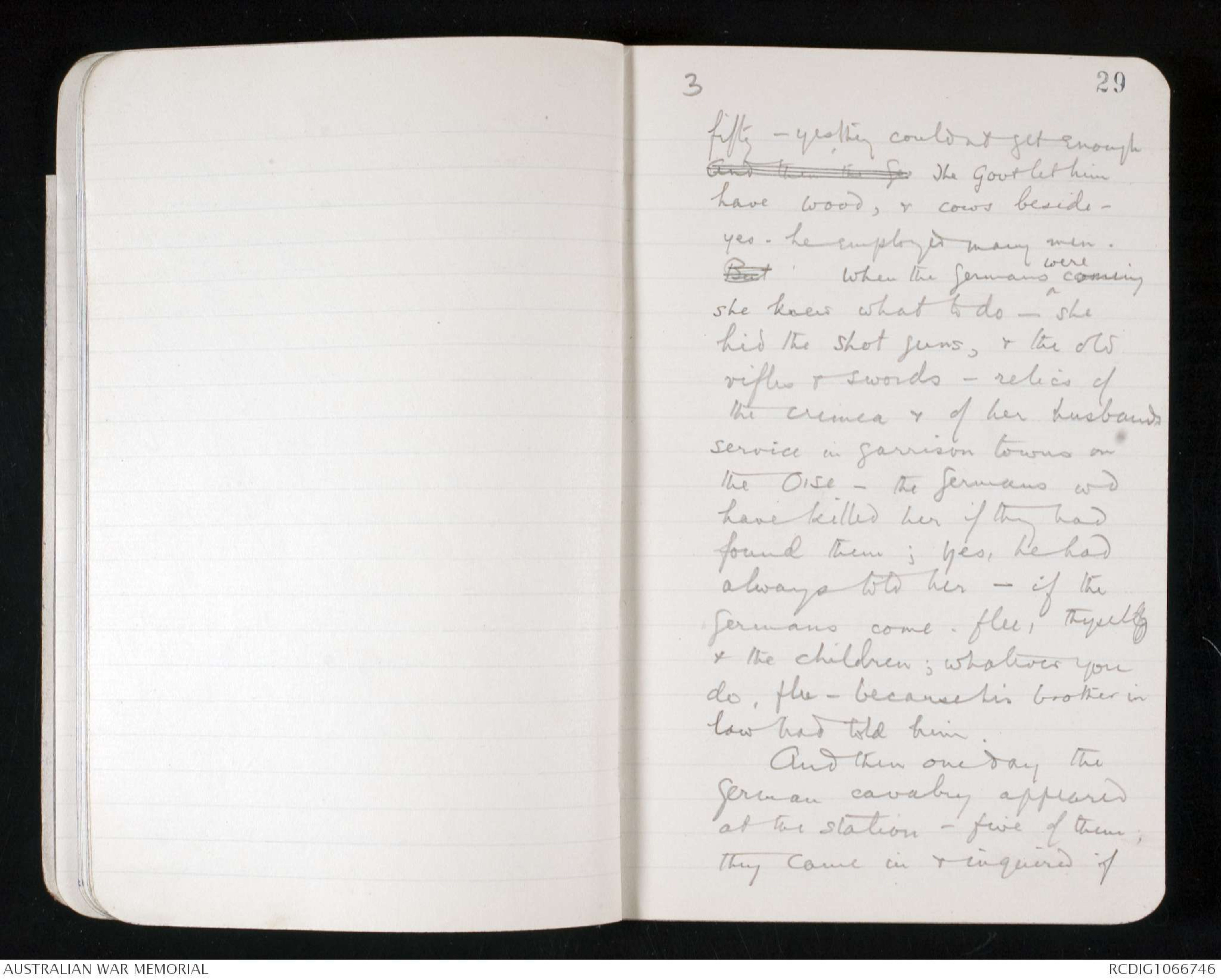
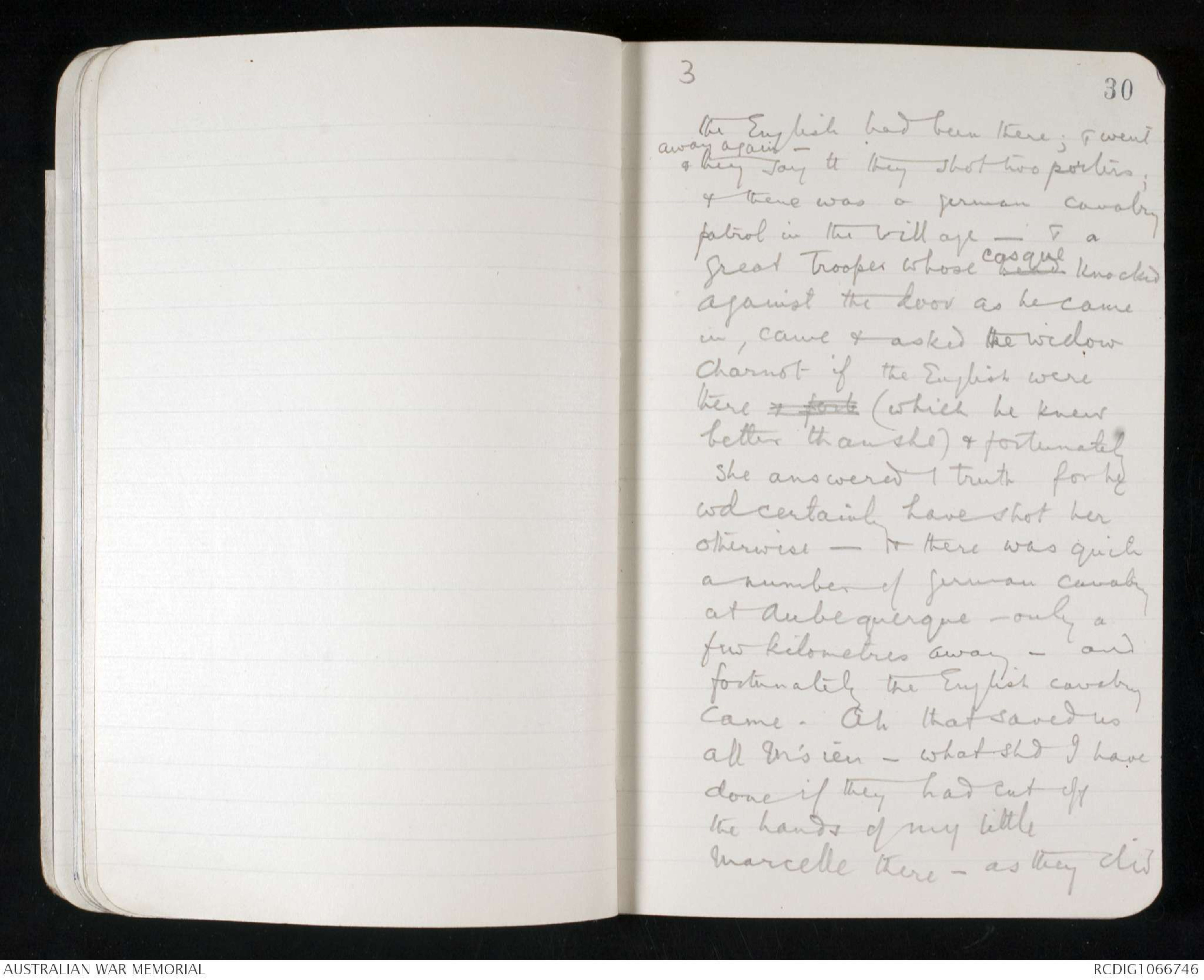
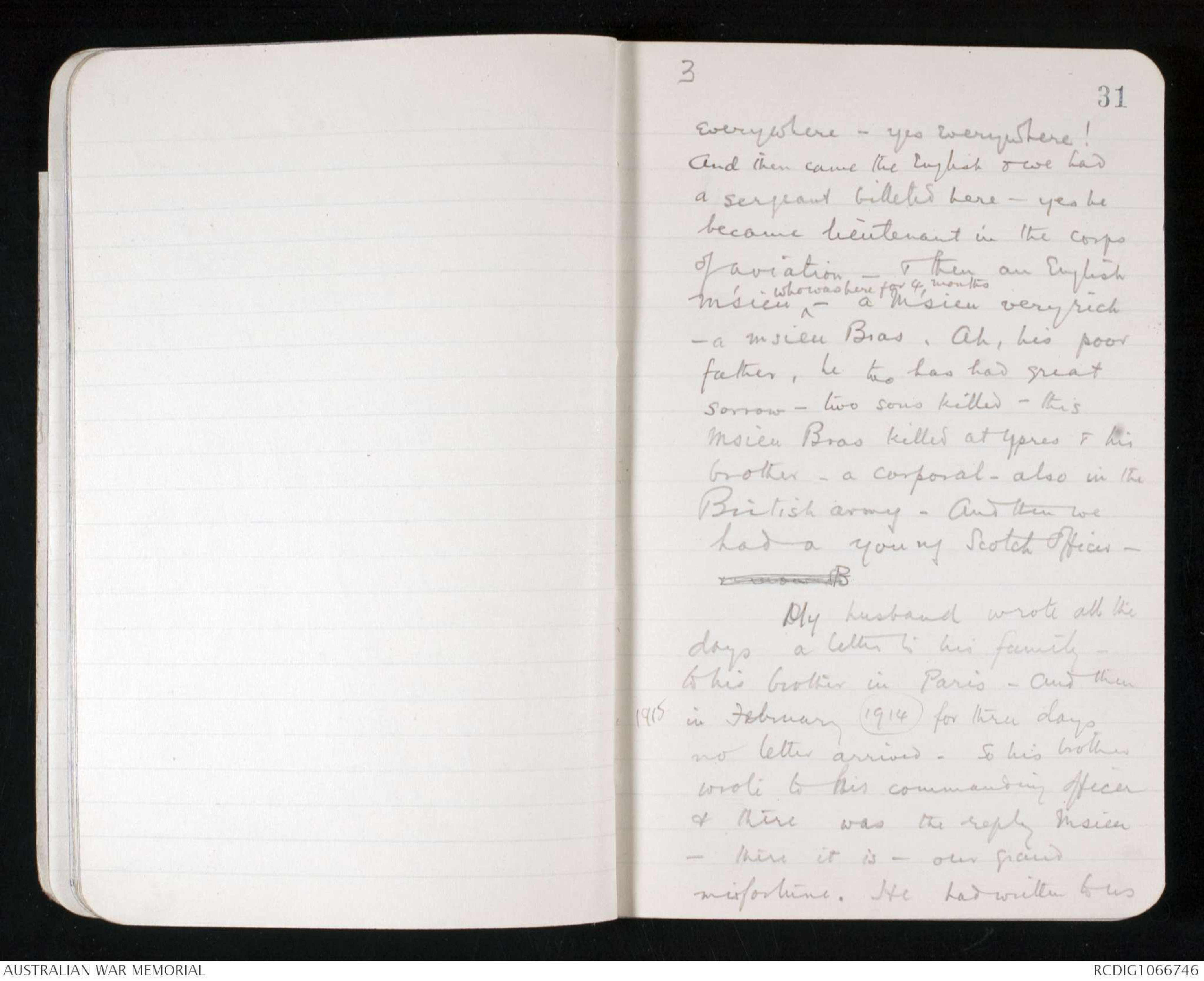
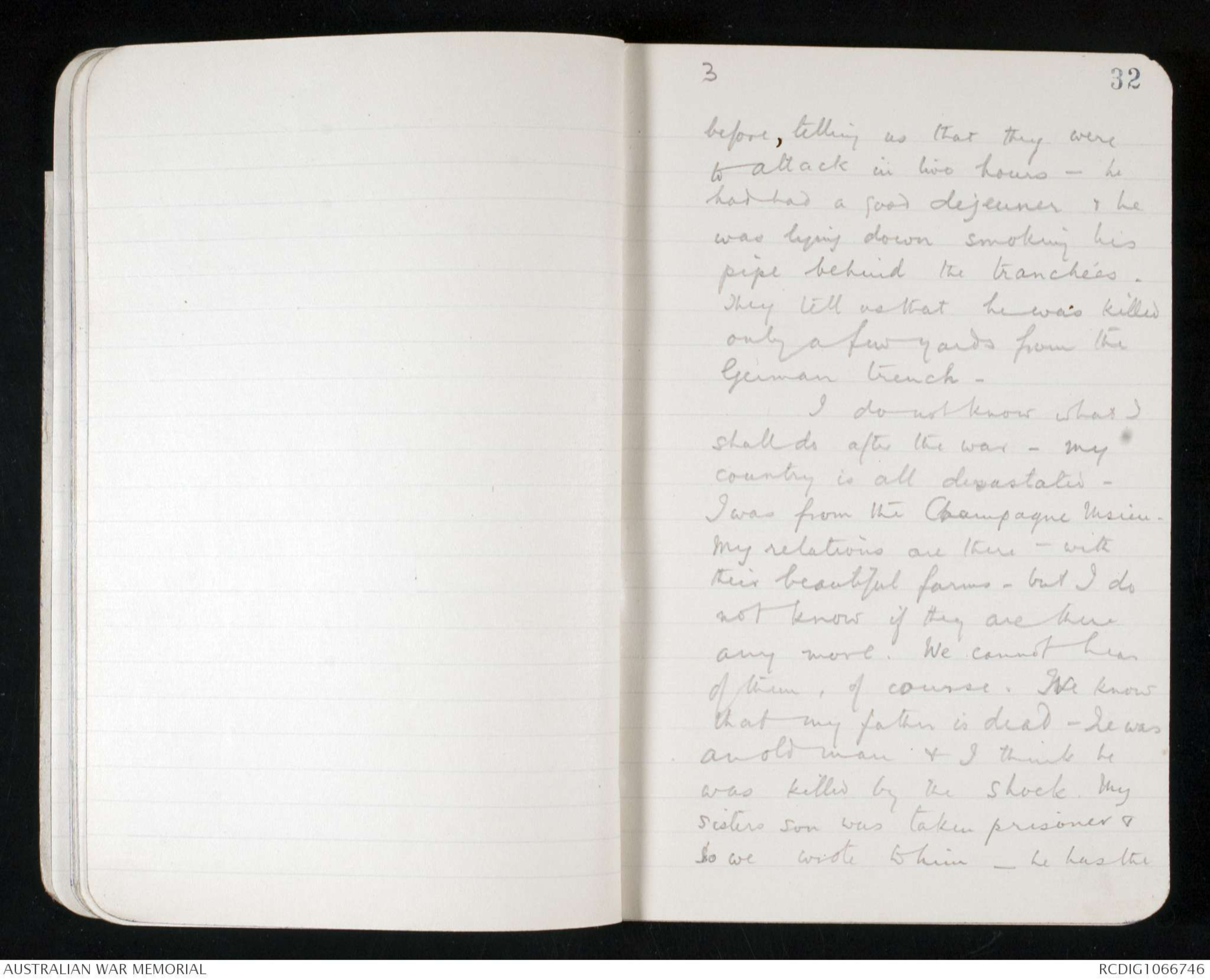
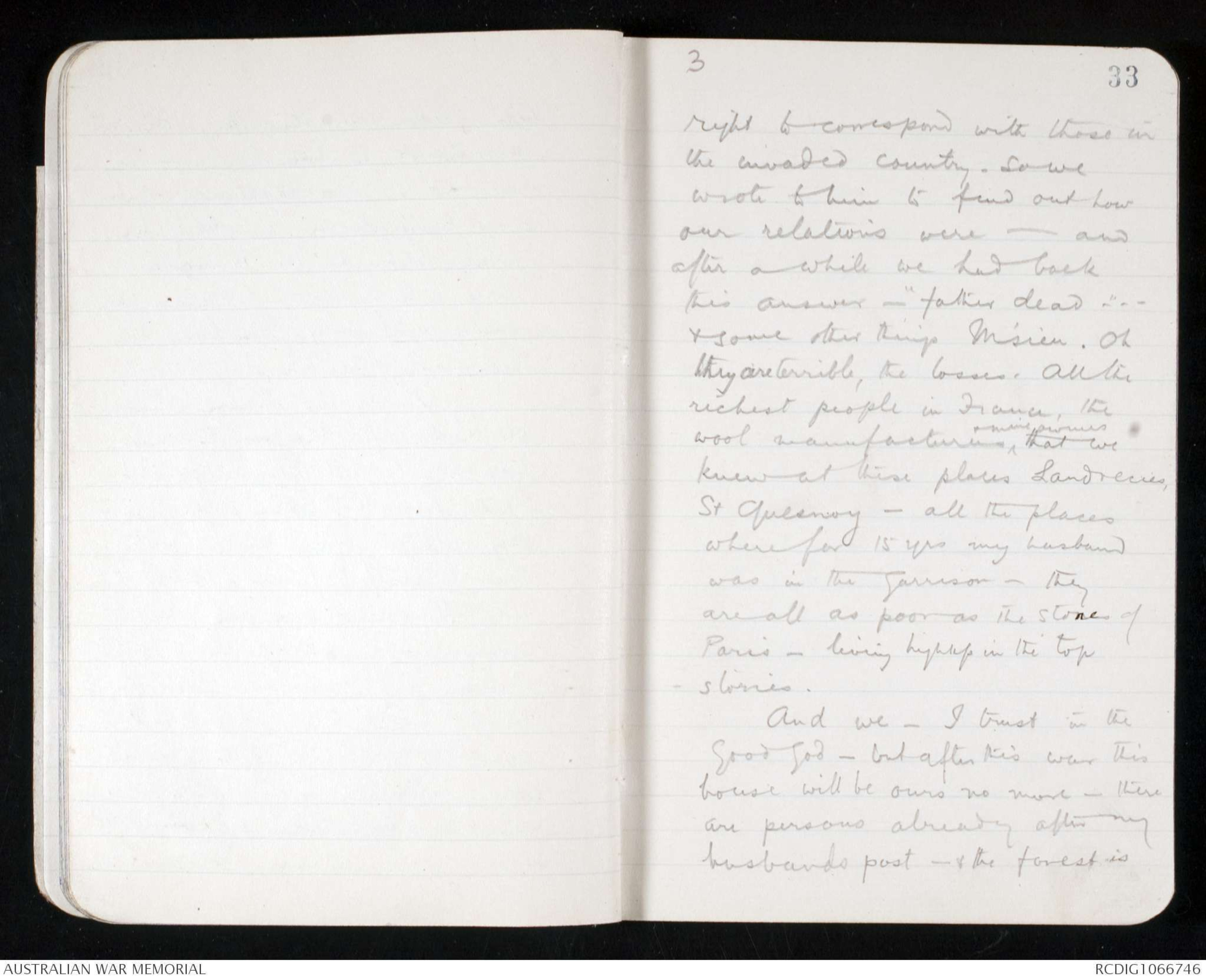
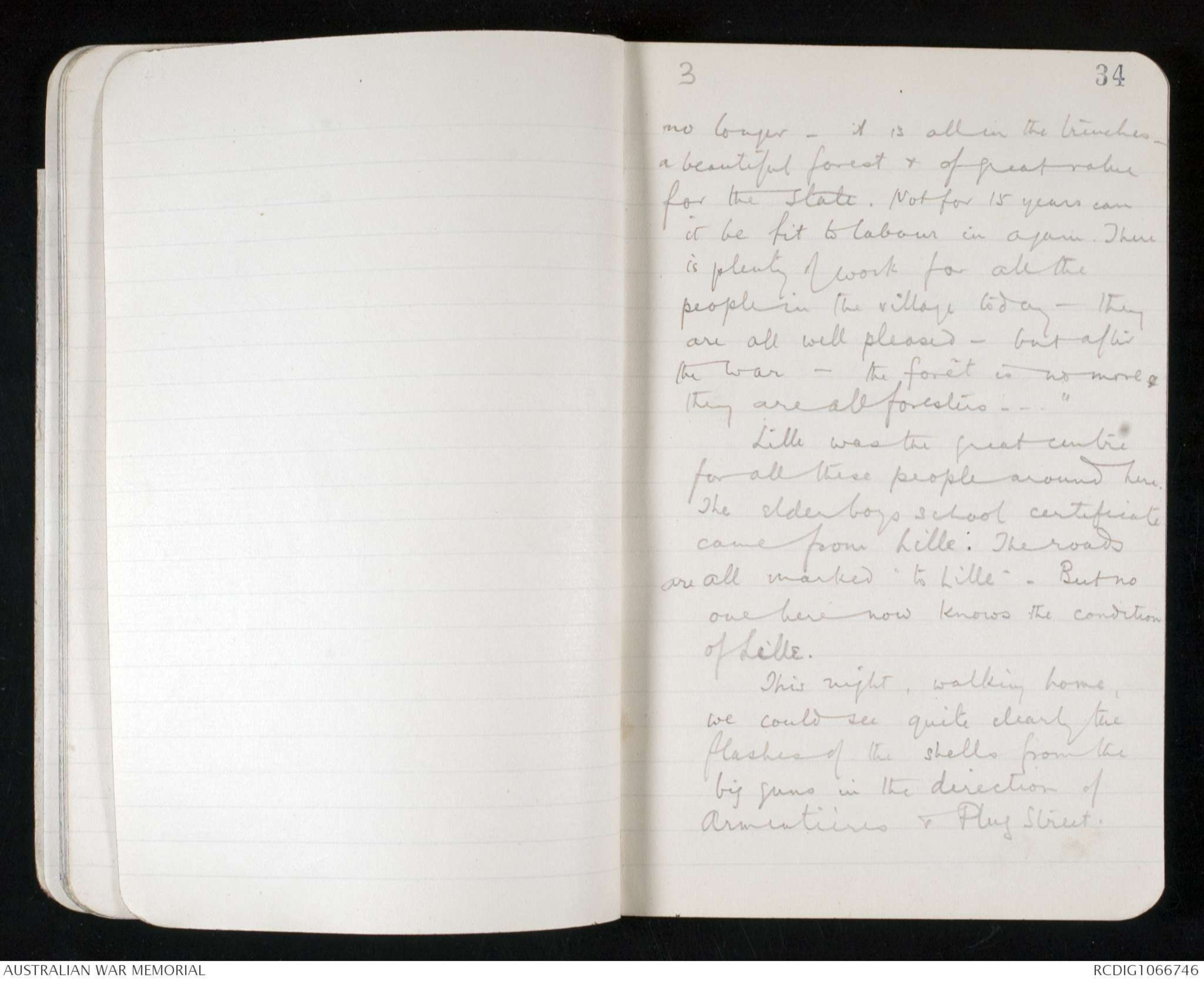
3 25
S. of Armentieres to get a little
experience of the trenches in
this country. The 2nd Divn
moves in first - they began to
go in yesterday in trenches
occupied by the "Bantams".
McConaghy sd th the Bantams
went into trenches wh / Guards
had held before them & had
to level up the banqueltes
two feet; this week, three of
our people going round /
trenches of the Bantams to see
/ ground, were sniped as
their heads stuck over /
parapet.
The corps wont be
formed, probly, till the 20th.
N.Z. are going into reserve.
2nd Divn has bn at Walten.
We reached our small
3 26
house & Churchill asked /
land lady if she had room.
"But yes, for officers," she sd.
Officers gave less trouble & left the
house in better condition - men
were apt to break things.
There ws plenty of room in
/ house -"my husband ws
killed in Arfonne, Msieu"
she sd - "for fifteen years
adjutant, & ^just promoted to
officer on the field of battle."
"Its the same I find
everywhere," Churchill sd.
"'Yes theres room - there's
' the room of my son - killed
'at Verdun - of my husband,
' killed four months ago"... They
tell you the same everywhere.
There was a long narrow
table covered w ail s American
leather, & a small neat
cooking stove in / front
3 27
room. One bedroom led off it,
& / other ws upstairs. There
was a washstand in the
front room - clearly the living
room, neat with an old tiled
floor.
Our landlady is a good mother,
I shd say, of her two sons - & they
seem good boys - Jacques Celestine
Eudot, & Marcelle Eudot. Little
Marcelle is very shy; Jacques
is 16 ½ & just approaching
military age. Their whole career
has been turned upside down by
/ loss of their father. Jaques
was to have gone to an English
family to learn English & they
wd have had a young
Englishman here in exchange.
The father went off to / war in
August - an adjutant. As he
3 28
went up / street he did not
weep - he told them - "it is for
you, my children, that I'm
fighting that there may be no more
wars" - (& so it really was).
After he had gone the Prussians
came - & stories of what they
were doing, Eudot had been a
child in 1870 - but his brother
in law, who had seen, had told
them all that / Prussians did
"you were only 2" he sd -
"but I, I was six & I remember".
Eudot was a forester in the
state forests & very fond of shooting
-he wd bring fifteen twenty
rabbits every day. The
rabbits destroyed the woods &
so the Govt let the foresters
shoot them - 15 rabbits a day
& Madame could sell them for
a franc - sometimes one franc
3 29
fifty - yes they couldnt get enough
and the the for The Govt let him
have wood, & cows beside -
yes. he employed many men.
But When the Germans ^were coming
she knew what to do - she
hid the shot guns, & the old
rifles & swords - relics of
the crimea & of her husbands
service in garrison towns on
the Oise - the Germans wd
have killed her if they had
found them; yes, he had
always told her - if the
Germans come, flee, thyself
& the children; whatever you
do, flee - because his brother in
law had told him.
And then one day the
German cavalry appeared
at the station - five of them
they came in & inquired if
3 30
the English had been there; & went
away again -
& they say th they shot two porters;
& there was a german cavalry
patrol in the village - & a
Great Trooper whose ^casque hand knocked
against the door as he came
in, came & asked the widow
Charnot if the English were
there & fort (which he knew
better than she) & fortunately
she answered / truth for he
wd certainly have shot her
otherwise - th there was quite
a number of German cavalry
at Aubequerque - only a
few kilometres away - and
fortunately the English cavalry
came. Oh that saved us
all M'sieu - what shd I have
done if they had cut off
the hands of my little
Marcelle there - as they did
3 31
everywhere - yes everywhere!
And then came the English & we had
a sergeant billeted here - yes he
became lieutenant in the corps
of aviation - & then an English
M'sieu ∧who was here for 4 months - a M'sieu very rich
- a Msieu Bras. Ah, his poor
father, he too has had great
sorrow - two sons killed - this
Msieu Bras killed at Ypres & his
brother - a corporal - also in the
British army. And then we
had a young Scotch Officer -
[[wounded]]
My husband wrote all the
days a letter to his family -
to his brother in Paris - And then
[*1915*] in February 1914 for three days
no letters arrived. So his brother
wrote to his commanding officer
& there was the reply Msieu
- there it is - our grand
misfortune. He had written to us
3 32
before, telling us that they were
to attack in two hours - he
had had a good dejeuner & he
was lying down smoking his
pipe behind the trenches.
They tell me that he was killed
only a few yards from the
German trench.
I do not know what I
shall do after the war - my
country is all devastated -
I was from the Champagne Msieu -
my relations are there - with
their beautiful farms - but I do
not know if they are there
any more. We cannot hear
of them, of course. We know
that my father is dead - he was
an old man & I think he
was killed by the shock. My
sisters son was taken prisoner &
so we wrote to him - he has the
3 33
right to correspond with those in
the invaded country. So we
wrote to him to find out how
our relations were - and
after a while we had back
this answer - "father dead . . .
& some other things M'sieu. Oh
they are terrible, the losses. All the
richest people in France, the
wool manufacturers ∧& mine owners that we
knew at these places Landrecies,
St Quensoy - all the places
where for 15 yrs my husband
was in the Garrison - they
are all as poor as the stones of
Paris - living high up in the top
stories.
And we - I trust in the
Good God - but after this war this
house will be ours no more - there
are persons already after my
husbands post - & the forest is
3 34
no longer - it is all in the trenches -
a beautiful forest & of great value
for the state. Not for 15 years can
it be fit to labour in again. There
is plenty of work for all the
people in the village today - they
are all well pleased - but after
the war - the forêt is no more &
they are all foresters . . ."
Lille was the great centre
for all these people around here.
The older boys school certificate
came from Lille. The roads
are all marked 'to Lille'. But no
one here now knows the condition
of Lille.
This night, walking home
we could see quite clearly the
flashes of the shells from the
big guns in the direction of
Armentieres & Plug Street.
 Deb Parkinson
Deb ParkinsonThis transcription item is now locked to you for editing. To release the lock either Save your changes or Cancel.
This lock will be automatically released after 60 minutes of inactivity.